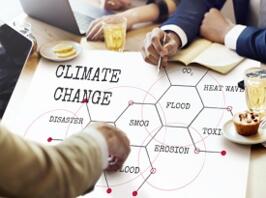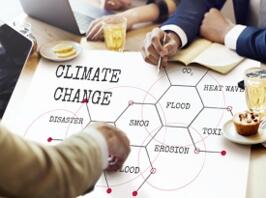Voters Blame Humans for Climate Change But Spare Air Travel, Meat Consumption
Voters see a climate change catastrophe ahead and tend to blame humans rather than Mother Nature for it. Those who blame humans want the government to do something about the threat but aren’t prepared to limit air travel or stop eating meat.
A new Heartland Institute and Rasmussen Reports national telephone and online survey finds that 63% of Likely U.S. Voters consider it likely that climate change will be catastrophic for humans, plants and animals, with 43% who say it’s Very Likely. Thirty-four percent (34%) think such a catastrophe is unlikely, including 16% who feel it’s Not At All Likely. (To see survey question wording, click here.)
Forty-eight percent (48%) believe climate change is caused primarily by human activity, the view held by climate change activists who seek major government intervention. Thirty-eight percent (38%) disagree and say long-term planetary trends are largely to blame. Fourteen percent (14%) are not sure. This is consistent with regular surveying in recent years.
Among voters who see human activity as the chief culprit, 76% believe the federal or state governments should require people to engage in activities that will lower carbon dioxide emissions. Fifty percent (50%) of these voters think the federal or state governments should punish with fines or jail time fossil-fuel business owners and/or executives.
But just 34% of voters who blame human activity for climate change want the government to require people to limit their air travel to help stop climate change. Only 24% of these voters believe government should require people to limit their consumption of meat to help stop climate change.
(Want a free daily e-mail update? If it's in the news, it's in our polls). Rasmussen Reports updates are also available on Twitter or Facebook.
The survey of 1,000 Likely Voters was conducted November 13-14, 2019 by the Heartland Institute and Rasmussen Reports. The margin of sampling error is +/- 3 percentage points with a 95% level of confidence. Field work for all Rasmussen Reports surveys is conducted by Pulse Opinion Research, LLC. See methodology.
Most voters continue to worry about global warming AKA climate change but not enough to part with their hard-earned money to do something about it.
Women and those under 40 are more likely than men and older voters to say it’s Very Likely climate change will be catastrophic to humans, plants and animals. Women and younger voters are also more likely to blame human activity for climate change.
Sixty-two percent (62%) of Democrats consider a climate change catastrophe Very Likely, compared to 24% of Republicans and 42% of voters not affiliated with either major party. Democrats by similar margins are the most likely to say human activity is primarily at fault.
Among voters who blame humans, however, there is far less difference of opinion when it comes to how the government should respond. Those under 40 are noticeably more likely than their elders, though, to favor government restrictions on air travel and meat consumption.
Sixty-seven percent (67%) of Democrats - and 48% of all voters - agree with Democratic presidential hopeful Bernie Sanders that the United States has only 12 years to aggressively fight climate change or else there will be disastrous and irreparable damage to the country and the world. But 61% of voters also think that most politicians just raise climate change issues to get elected rather than to address real problems.
Only 23% agreed with Democratic Congresswoman Alexandria Ocasio-Cortez in January when she said climate change is our World War III and that the world will end in 12 years if the issue is not addressed. Ocasio-Cortez called for restrictions on air travel and cars.
Democrats are far less convinced than Republicans and unaffiliated voters that a free-market system is superior to a socialist one and are much more willing to vote for a socialist candidate. Those under 40 are a lot more responsive to the siren call of socialism than older voters are.
While some climate change activists have proposed criminally prosecuting those who question the science behind it, most voters have said in surveys over the past several years that the scientific debate over global warming is not over.
Additional information from this survey and a full demographic breakdown are available to Platinum Members only.
Please sign up for the Rasmussen Reports daily e-mail update (it’s free) or follow us on Twitter or Facebook. Let us keep you up to date with the latest public opinion news.
The survey of 1,000 Likely Voters was conducted November 13-14, 2019 by the Heartland Institute and Rasmussen Reports. The margin of sampling error is +/- 3 percentage points with a 95% level of confidence. Field work for all Rasmussen Reports surveys is conducted by Pulse Opinion Research, LLC. See methodology.
Rasmussen Reports is a media company specializing in the collection, publication and distribution of public opinion information.
We conduct public opinion polls on a variety of topics to inform our audience on events in the news and other topics of interest. To ensure editorial control and independence, we pay for the polls ourselves and generate revenue through the sale of subscriptions, sponsorships, and advertising. Nightly polling on politics, business and lifestyle topics provides the content to update the Rasmussen Reports web site many times each day. If it's in the news, it's in our polls. Additionally, the data drives a daily update newsletter and various media outlets across the country.
Some information, including the Rasmussen Reports daily Presidential Tracking Poll and commentaries are available for free to the general public. Subscriptions are available for $4.95 a month or 34.95 a year that provide subscribers with exclusive access to more than 20 stories per week on upcoming elections, consumer confidence, and issues that affect us all. For those who are really into the numbers, Platinum Members can review demographic crosstabs and a full history of our data.
To learn more about our methodology, click here.





